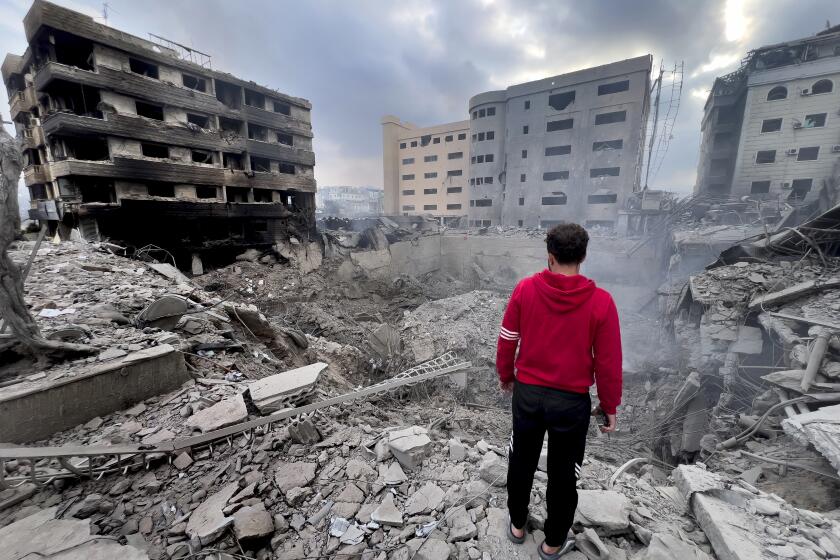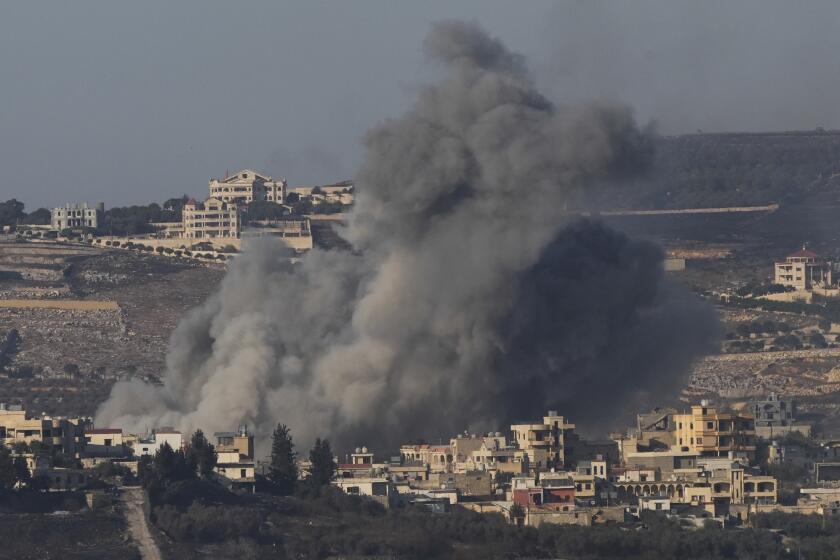
- Share via
- Elie Alwan gave up his home in a Christian village to shelter a Shiite family fleeing violence in southern Lebanon. He thought they’d be safe.
- But an Israeli missile lanced through his house, killing the 23 people inside, including more than a dozen women and two children.
- Now many people are afraid of sheltering people from majority Shiite areas where Hezbollah operates. Others fear the expanding conflict and mass displacement could worsen long-standing sectarian tensions.
AITOU, Lebanon — Elie Alwan didn’t hesitate when he learned a friend’s family was living on the streets after fleeing southern Lebanon amid Israeli bombardment. He moved the family — Shiites from the village of Aitaroun — into his house in Aitou, a hillside village in the country’s northern Christian heartland.
He went to stay at a nearby family member’s house, secure in his belief that, with the Israeli border almost 100 miles away, he and the Shiite family he sheltered were safe from the fighting between Israel and the Lebanese Shiite militant group Hezbollah.
He was wrong. This week, an Israeli missile lanced through his house, killing the 23 people inside, including more than a dozen women and two children.
The strike — one of the deepest inside Lebanon since Israel’s invasion this month — has provoked feelings of dread for residents of Aitou and other Christian villages in the north. Having welcomed displaced Shiites, many people are now afraid of inadvertently sheltering anyone who might have a connection with Hezbollah.
With the scope of Israel’s assault expanding to areas far from Hezbollah’s bastions, so are the fears it could exacerbate Lebanon’s long-standing sectarian tensions — those that from 1975 to 1990 embroiled the country and its 18 religious sects in a brutal civil war.
Roughly five minutes before the strike, Alwan said, a man drove up to the house with cash assistance he was distributing to displaced families in the area. Alwan said he understood the man to be a journalist with a Hezbollah-affiliated media outlet; others believed he may have been an official with the group. In any case, he was spotted driving through other villages in the area before he came to Aitou, checking on the displaced.
Hezbollah critics and supporters alike are voicing frustration over what many view as the group’s miscalculations.
“I’ve known the family for 15 years,” Alwan said, his eyes welling up as he trudged around the wreckage of his home, stepping between pooled blood, children’s books and shredded clothing. “These people had nothing to do with Hezbollah — their relatives told me they had no connection to the guy who came to see them.”
His eyes lingered at the spot where his house stood. He had spent seven years building it, doing piecemeal construction whenever he managed to save some money.
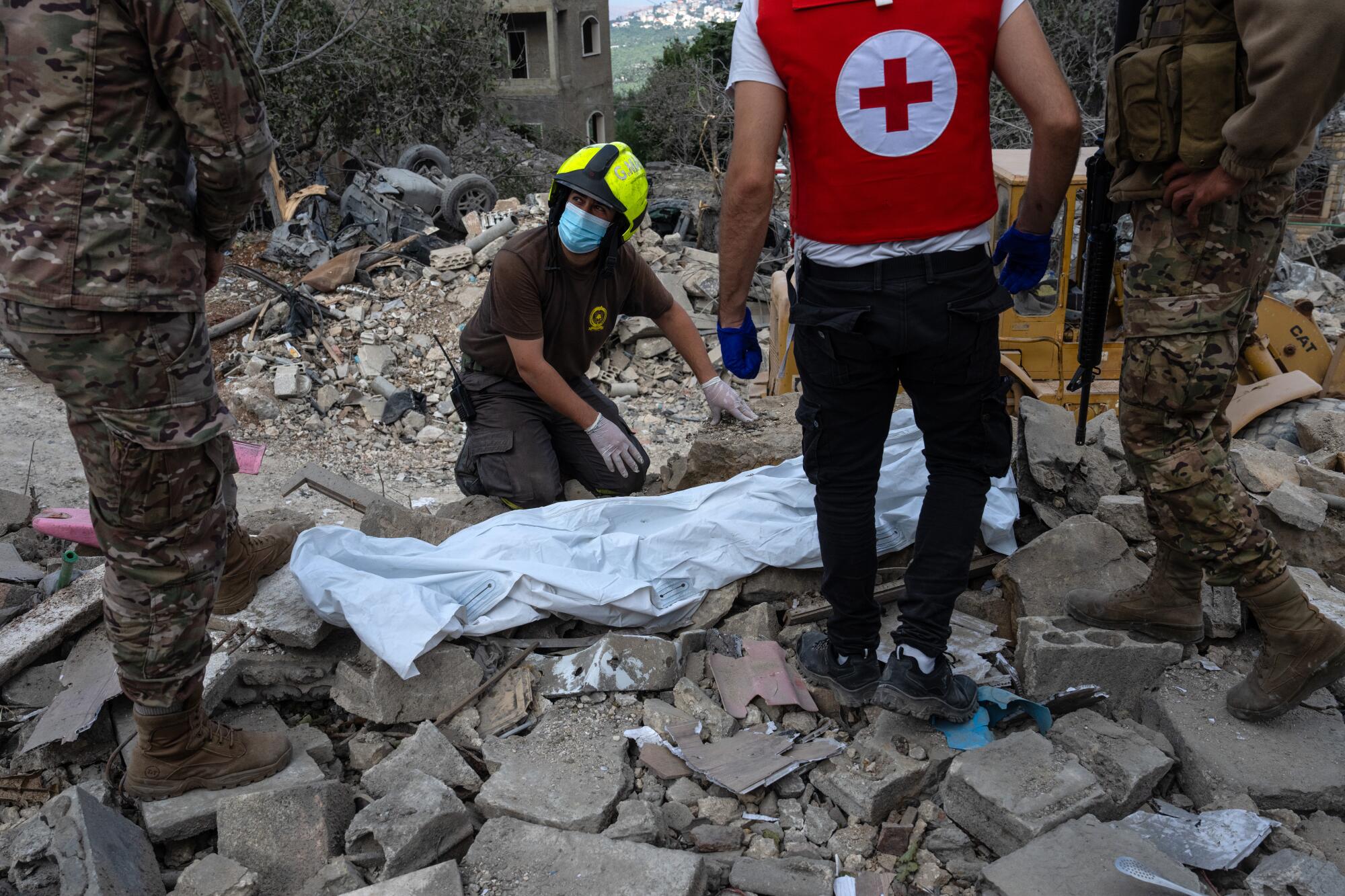
“It’s like losing a part of yourself,” he said.
Nearby, Lebanese army soldiers surrounded a Chevy Silverado where the body of an infant had been discovered, face down in the back seat, a day after the blast sent debris and body parts in a wide arc. “The mother is in the hospital. She’s still alive,” said one of the soldiers. She was one of six survivors wounded outside the targeted home, officials said.
Christian villages in southern Lebanon thought their neutrality may spare them from violence in the Israel-Hezbollah conflict. Then the evacuation orders came.
In the strike’s aftermath, Aitou residents were “terrified of the displaced,” said Raymond Alwan, a mukhtar, or notable in the village and a distant relation to Elie. He said two Shiite families had been asked to leave the area, while many others left on their own.
“You feel like you’re heartless for evicting them, but at the same time people are afraid — the displaced can be in the same home, same building, same neighborhood,” he said, adding that the municipality was working with security services to vet newcomers and ensure they have no links to Hezbollah. In the meantime, he was telling villagers to remain calm.
“Not everyone is connected to what’s happening,” he said. “But you can’t blame people here being afraid for their lives.”
Raheel Dandash, 32, had relocated to Aitou with her husband and seven other relatives from a Shiite-majority area in the Bekaa Valley just weeks ago, after Israel ramped up its offensive with thousands of airstrikes.
“We didn’t expect anything to happen here,” she said. “We came to this village because it’s safe.”
She was peeling potatoes in the kitchen when the Israeli missile strike nearby sprayed glass across the room.
Now she will have to move her family yet again. She’s not sure where they can go, but they won’t look in Aitou — she wasn’t sure they would be welcome.
“Israel is making people afraid of us Shiites,” she said. “They’ve attacked this place to cause fitnah [strife] between us and Christians.”
The family that was killed had been generous with her, she said, with lunch invitations and help finding cheaper groceries. “These people were civilians, they had nothing to do with this war.”
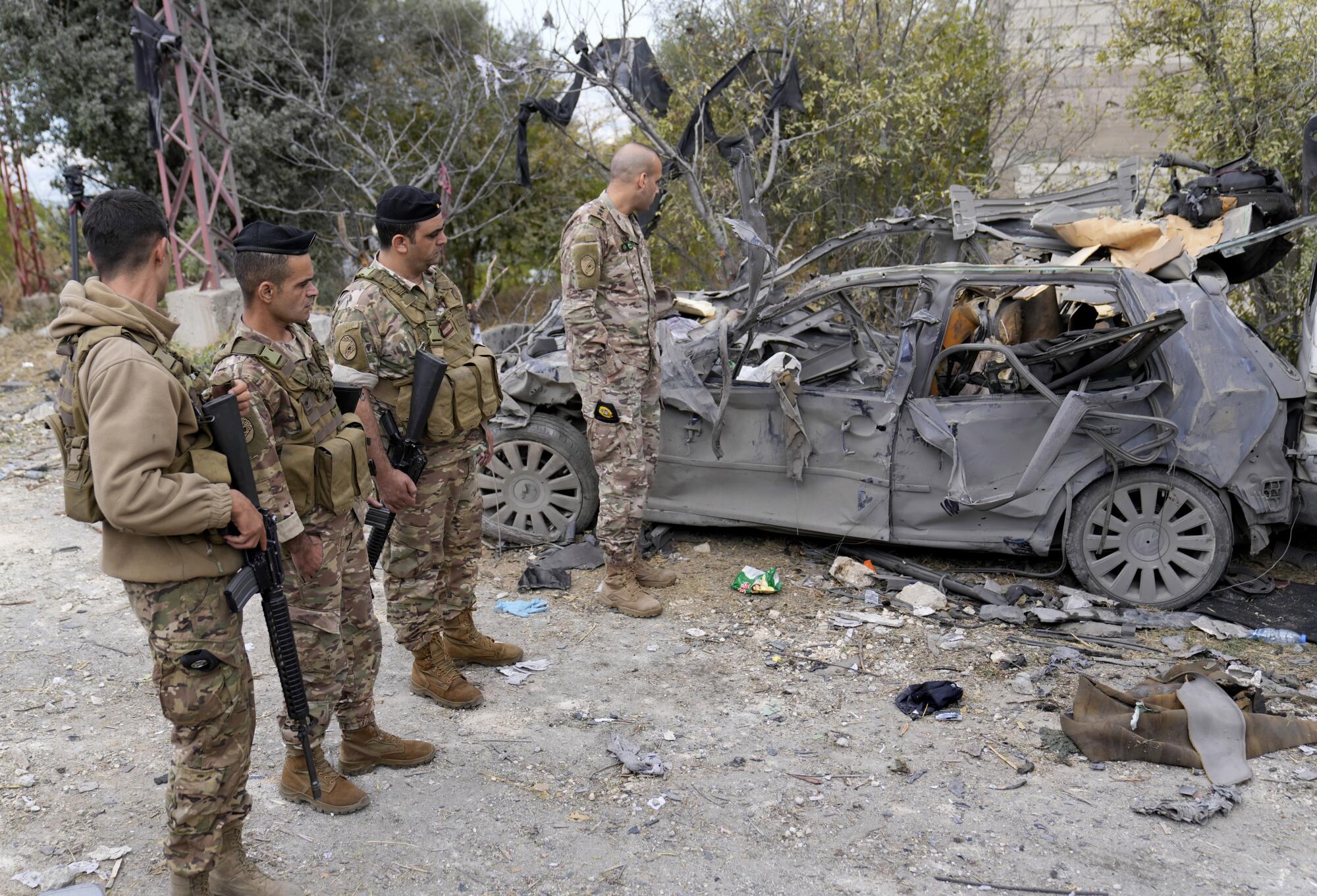
The Israeli military, in response to detailed questions about the strike from The Times, said it “struck a target belonging to the Hezbollah terrorist organization in northern Lebanon” but did not elaborate. It said “the claim that Lebanese civilians were killed as a result of the strike is under review.” The United Nations’ human rights office has called for an independent investigation.
In statements and media interviews, Israeli officials have said they are aiming to degrade Hezbollah and return to north Israel residents who fled amid Hezbollah missile and rocket attacks, which began a day after Palestinian militants from Hamas attacked southern Israel on Oct. 7, 2023. Hezbollah said it was seeking to aid Hamas and force Israel to fight on two fronts.
Sinwar’s killing ends a yearlong hunt for the Palestinian leader, who orchestrated Hamas’ war with Israel.
Some 60,000 people from northern Israel and 90,000 in southern Lebanon were displaced during a year of tit-for-tat border attacks. Since Israel expanded its air campaign in September, more than 1,500 people have been killed and more than 1.2 million people displaced — nearly a quarter of the Lebanese population — the majority of them Shiites — from Lebanon’s south, the Bekaa Valley and the Hezbollah-dominated Beirut suburbs known as the Dahiya.
Subsequent evacuation orders from the Israeli military extend to the center of the country, rendering more than a third of Lebanon nearly inaccessible and turning once lively cities into ghost towns.
Nadim Houry, director of the Arab Reform Initiative think tank, said that the Israeli strike in the north — an area dominated by Sunni Muslim and Christian parties, including those against Hezbollah — shows there are no geographic limits to where Israel could bomb “regardless of how tenuous the connection with Hezbollah may be.”
Israeli officials say their war is not against the Lebanese but Hezbollah. In a televised address last week, Israeli Prime Minister Benjamin Netanyahu exhorted Lebanese to take advantage of Hezbollah’s weakness and “take back” their country, or fall “into the abyss of a long war that will lead to destruction and suffering like we see in Gaza.”
For the Lebanese, such talk of encouraging one group to rise against another evokes memories of the civil war, when Lebanon’s religious sects were embroiled in an internecine, hugely destructive conflict that killed more than 150,000 people and turned Beirut into a byword for tragedy.
The conflict drew in the U.S., Syria and Israel, which occupied parts of Lebanon for almost 18 years. Hezbollah — which was formed in response to Israel’s invasion — played a major role in Israel’s withdrawal in 2000.
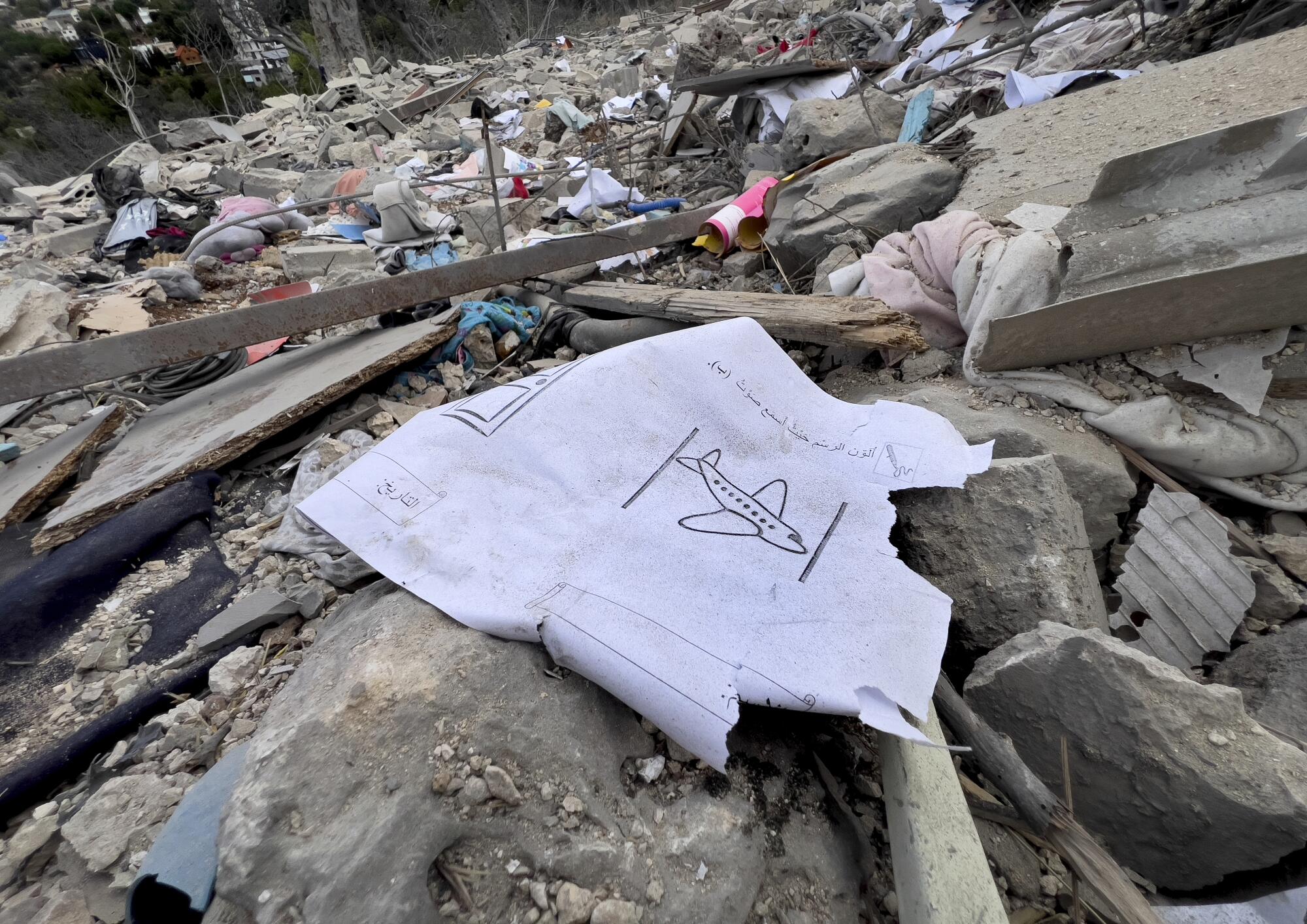
Though the war ended more than three decades ago, the country remains in many ways mired in the politics of the past, with warlords-turned-political-chieftains ruling to this day and drawing their support from their respective sects.
Israel’s assassination of Hezbollah leader Hassan Nasrallah set off furious grief or grim satisfaction, redoubling fears of a widening regional war.
Peter Harling, founder of the Synaps Lab think tank in Beirut, suggested that Israel views sectarian tensions as a way to bring Lebanese outside Hezbollah’s traditional communities on its side.
“Israel wants to believe it still enjoys some support within Lebanese society,” he said. But “its actions are in fact creating intense rejection across the board,” he added.
He pointed out that despite the level of displacement and the move of the majority of the displaced to Christian and Sunni Muslim areas, “there has been remarkably little violence.”
“In Lebanon, the fear of even a hint of a return to civil war proofs against civil strife,” he said.
Father Estephan Frangieh, who manages the hospital in the city of Zgharta, where Aitou’s wounded were taken, feared that divisions would worsen. And he worried that is exactly the message Israel aims to send.
“They’re saying to Christians, ‘Don’t accept Shiites in your home.’ But these people aren’t coming from the moon; they’re Lebanese,” he said.
He suggested the strike was done in a way to maximize the fear: “They could have hit that [aid distributor’s] car anywhere on the road. Why do it here? It’s because they want to scare people.”
Frangieh added that even if a Hezbollah member came to the house, it did not justify killing 22 other civilians. “Is it legal or moral to bomb a place with children? There are rules in war,” he said. “I say this as a priest. How can you accept this?”
Elie Alwan, owner of the bombed house, knows what happened in Aitou will affect displaced Shiites elsewhere. But he also called on the displaced to be more careful in their host communities.
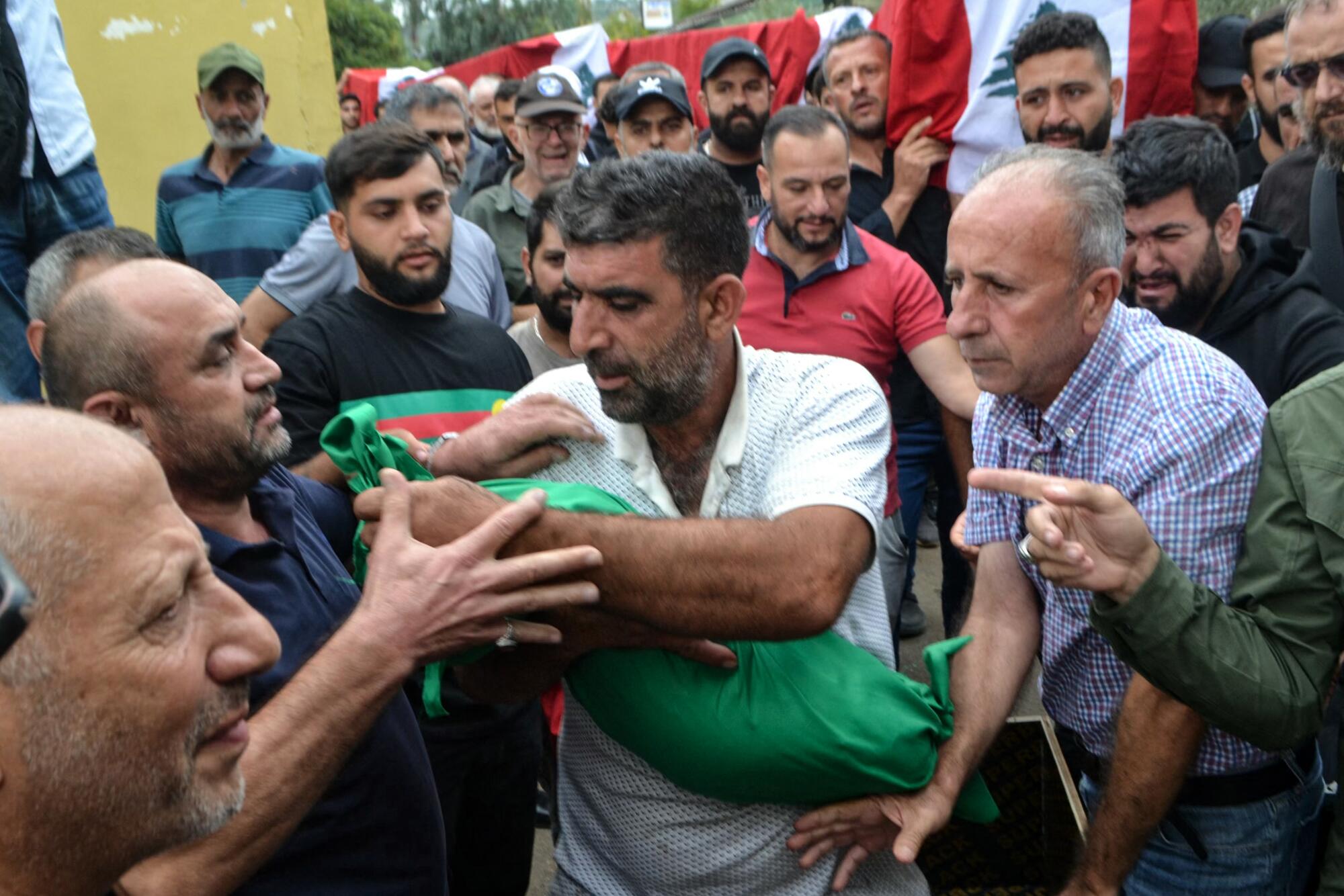
“I ask those living in people’s homes, and the people who want to come visit or help them, not to bring danger to them, like what happened to me,” he said. “Let those who want to help do it indirectly. Don’t destroy people’s homes.”
Moments later, Red Cross workers arrived and searched the site for body parts they had missed the day before. Above, a pair of Israeli warplanes traced white lines in the sky.
One rescue worker took a tiny body bag and leaned into the pickup truck for the infant’s body. He emerged with a small bundle and turned toward a waiting ambulance. The soldiers and neighbors watched him walk down the hill out of sight, all silent.
More to Read
Sign up for Essential California
The most important California stories and recommendations in your inbox every morning.
You may occasionally receive promotional content from the Los Angeles Times.
